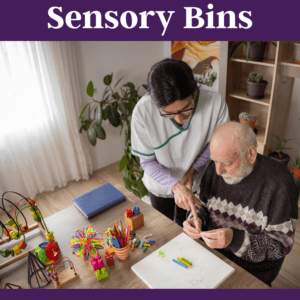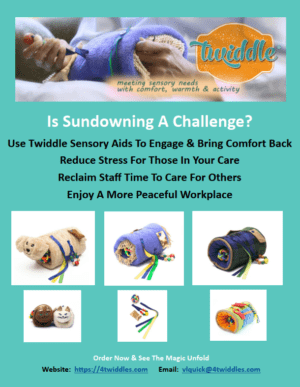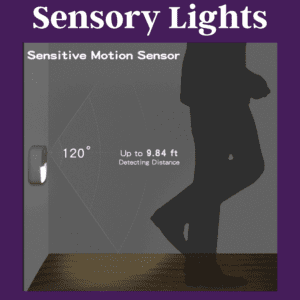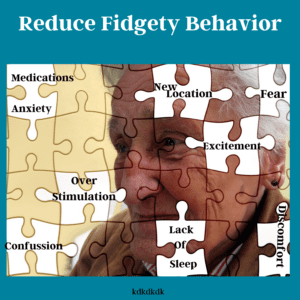Products to Calm Fidgety Behavior in Alzheimer’s and Dementia Patients
Submitted by Beth Rush
Founder and Managing Editor
Body+Mind Magazine
Alzheimer’s disease and other types of dementia may cause fidgety behavior and need someone to calm them. If you know someone with these tendencies, you understand these challenging tasks. Fortunately, there are products and strategies to calm agitation and help your loved ones.
 1. Aroma Therapy
1. Aroma Therapy
People with Alzheimer’s disease or other dementias need stimulation when they get in fidgety moods. Aromatherapy is among the most accessible solutions to agitation because the smells enter your brain and bloodstream. Pick scents your loved one is most familiar with and implement essential oil diffusers to calm them.
Aromatherapy should be a go-to practice because recent research has attested to its effectiveness. A 2022 Dementia and Geriatric Cognitive Disorders Extra study determined aromatherapy was safe and effective when managing behavioral and psychological symptoms of dementia. Lavender, sandalwood and jasmine are typical soothing aromas to encourage calmness.
 2. Sound Therapy
2. Sound Therapy
Another worthwhile strategy to calm agitation is sound therapy. Noise can help or harm people with dementia, so tailoring it to the patient is critical. For instance, a 2020 International Psychogeriatrics study investigated different noises in nursing homes and how they affected residents. The researchers found that high-intensity sounds decreased sleep, while music mitigated agitation.
Play your patient’s favorite music to stimulate their brain and bring comfort. Other ideas include singing familiar songs and asking their friends to join. If you include additional instruments, they could further stimulate their senses. This art engagement helps the brain remember emotions and is excellent for sensory activities.
 3. Fidget Toys
3. Fidget Toys
Fidget toys benefit people with Alzheimer’s and other dementias because of their scalability. These gadgets can fit in small hands or on a desk for your patient to play with. Regardless, they get stimulation and stress reduction by playing with fidget toys.
One of the best fidget devices for seniors is Twiddle. These aids reduce anxiety and increase engagement by letting people with dementia safely stimulate their brains. Manipulating these gadgets aids their senses and reduces fidgeting because their hands are occupied. They also get benefits like dexterity and hand-eye coordination.
4. Sensory Products
Imagine your loved one experiences agitation and needs someone to calm them down. You give them a sensory bin with various tools to stimulate their brain. some people may feel relaxed after touching sand, rice, soft materials, and other comforting materials. Others may feel more comfortable with screw-like gadgets that remind them of their work or hobbies of the past.
 Sensory bins are a worthwhile solution to fidgeting because they promote awareness and cognitive function with each use. They’re also beneficial for their flexibility, considering you can swap for their favorite materials. Insert playdough, dry beans, or water beads to provide relaxing outlets.
Sensory bins are a worthwhile solution to fidgeting because they promote awareness and cognitive function with each use. They’re also beneficial for their flexibility, considering you can swap for their favorite materials. Insert playdough, dry beans, or water beads to provide relaxing outlets.
You can increase stimulation through sensory games by turning them into puzzles. Place an object in the bin and ask your patient to find it, although you should make it simple to avoid agitation.
5. Puzzle Games
People with dementia enjoy jigsaw puzzles because they feel accomplished upon their completion. They also foster social connections with friends who want to participate.
 If you think your patient will enjoy these activities, provide a jigsaw puzzle under 100 pieces to limit confusion and difficulty levels. Those with over 100 pieces could increase agitation and require additional aid to calm them. While jigsaw puzzles are famous, they aren’t the only strategies to calm fidgety behavior. Consider easy crosswords or word searches to maximize mind stimulation without overwhelming your patient’s cognitive abilities.
If you think your patient will enjoy these activities, provide a jigsaw puzzle under 100 pieces to limit confusion and difficulty levels. Those with over 100 pieces could increase agitation and require additional aid to calm them. While jigsaw puzzles are famous, they aren’t the only strategies to calm fidgety behavior. Consider easy crosswords or word searches to maximize mind stimulation without overwhelming your patient’s cognitive abilities.
Encouraging these games benefits your patient in the long run because it aids brain function. A 2023 General Nursing Science Journal study found 20 minutes of puzzle therapy daily improved cognitive and intellectual function for seniors.
6. Weighted Blankets
Experts say weighted blankets reduce anxiety symptoms and are popular with people of all ages. That said, these devices work well for people with Alzheimer’s disease or other dementias because they’re calming and grounding. With a weighted blanket, you feel secure and warm and less of a need to fidget. Older adults may benefit from a blanket weighing less than 8 pounds.
People with dementia may have trouble sleeping because of scary thoughts and delusions. Sometimes, the individual may believe something false and have difficulty shaking it. These heavier blankets aid rest and reduce these psychological behaviors. A 2021 International Journal of Qualitative Studies in Health and Well-being study found that weighted blankets helped patients with dementia fall asleep and increase energy levels.
 7. Motion Sensor Lights
7. Motion Sensor Lights
People with Alzheimer’s disease or other dementias have a higher risk of wandering, with experts saying six in 10 will do it at least once. This occurrence is more worrisome at night because your patient may be uncertain about their location. If their eyesight is poor, they could be confused and begin feeling agitated. Motion sensor lights mitigate this anxiety and make wandering less risky.
Place motion-detection lights in the most frequently traveled walkways to aid their vision. Bedrooms, bathrooms, and living areas are common-sense locations for these fixtures. Remember to put at least one in the kitchen to prevent accidents. Lights are essential to reduce the risk of falling — the second-leading cause of death due to unintentional injuries.
 8. Hand Massagers
8. Hand Massagers
Suppose your patient with dementia is experiencing anxiety symptoms and is shaking their hands. How can you calm their agitation and fidgety behavior? One solution is to use a hand massager. These small devices target stress in the hand and relieve the tension bothering them. With a hand massager, you can help your patient reduce restlessness and return to a more comfortable state.
If you use a hand massager, watch the patient’s response to ensure it’s soothing. While some find relaxation, others might not have the same experience. A manual hand massage may be necessary to calm their anxiety and protect their safety. A 2022 Geriatric Nursing study found caregiver-performed massages reduced the behavioral and psychological symptoms of dementia.
 What Causes Fidgeting?
What Causes Fidgeting?
Fidgeting is a common symptom of Alzheimer’s or other dementias, although its origin could differ. Here are a few reasons why your patient exhibits fidgeting behavior and needs solutions to calm them down:
- Medications: Antipsychotic medications could cause fidgeting and restlessness. Check with your patient’s general practitioner to discuss these symptoms.
- New locations: People with dementia may need help adapting to new locations. For instance, traveling to a new facility or an unfamiliar room could be unnerving.
- Room conditions: Discomfort and fidgeting could originate with the room conditions. Ask your patient if they’re too warm or cold and need a temperature change. Lighting could also be a driving factor in their fidgeting.
- Fear: If delusions occur, they could be based on fear and cause fidgeting. While usually occurring in the later stages of dementia, they could arise anytime.
- Bathroom needs: Fidgeting may be a sign your patient needs to use the restroom. Prompt responses are necessary to reduce accidents and further discomfort.
Using Strategies to Calm Agitation in Alzheimer’s Patients
If somebody with Alzheimer’s or another dementia feels agitated, their safety and comfort are at risk. Therefore, it’s essential to care for them and calm their fidgeting behavior. Simple products like music, weighted blankets, and puzzles can stimulate patients’ brains and make them more comfortable. Find what works best for your patients and ensure they don’t feel overwhelmed by the therapeutic solutions.

Beth Rush
Founder and Managing Editor
Body+Mind Magazine
Beth Rush is the mindfulness editor at Body+Mind. She writes about caring for loved ones with Alzheimer’s disease. She also shares tips for coping with c-PTSD, PCOS, and climate anxiety. Her goal is to encourage readers to live their best lives. Subscribe to the Body+Mind Newsletter for more posts by Beth.

 1. Aroma Therapy
1. Aroma Therapy 2. Sound Therapy
2. Sound Therapy 3. Fidget Toys
3. Fidget Toys
 8. Hand Massagers
8. Hand Massagers What Causes Fidgeting?
What Causes Fidgeting?